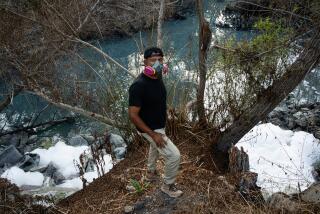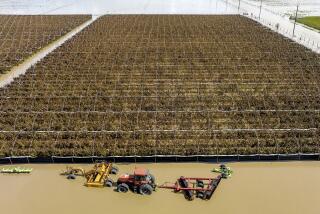Farm Chemical Runoff Tied to Massive Fish Kill
- Share via
BATON ROUGE, La. — A chemical used by sugar cane growers to control pests is to blame for the deaths of at least 750,000 fish this summer in south Louisiana waterways, state and federal environmental officials said Wednesday.
Unusually heavy rains contributed to the massive kills by washing the chemical, azinphos-methyl, into rivers and bayous before it could break down, the officials said.
The state Agriculture Department banned the use of azinphos-methyl, which is toxic to humans, this week after residents of Grosse Tete, La., just west of Baton Rouge, complained that a crop-duster had sprayed their town.
In one of the kills, all aquatic life along nearly 10 miles of Bayou Lafourche was wiped out, said Maureen O’Neill, assistant secretary of the state Department of Environmental Quality.
She said 19 separate kills had occurred and that the number of fish that died may actually be much higher than the estimated 750,000.
Paul Conzelmann, a biologist with the U.S. Fish and Wildlife Service in Lafayette, La., said there is little doubt that the chemical caused the fish to die, even though the sugar cane growers have said that other factors, such as oxygen depletion caused by the summer’s heat, could have caused the problem.
O’Neill said sugar cane growers used particularly heavy applications of azinphos-methyl this summer because mild weather last winter had led to infestations of the sugar cane borer, an insect that can badly damage crops.
She said the problem was exacerbated by crop-dusters who sometimes applied the chemical during or just before this year’s frequent rainstorms.
More to Read
Sign up for Essential California
The most important California stories and recommendations in your inbox every morning.
You may occasionally receive promotional content from the Los Angeles Times.













